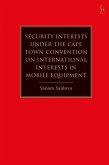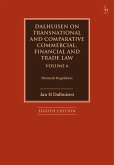This book is the first detailed and comprehensive research of the history of the Cape Town Convention and its protocols. It critically engages with the challenges faced by the developers of this treaty, analyses thousands of pages of archived materials and derives important lessons for the development of transnational commercial law globally.
The book is an invaluable addition to the existing literature on the Cape Town Convention. It also informs the debate about harmonisation of secured transactions regimes generally, and as such will be of interest to academics, legal practitioners and the judiciary involved in secured transactions law around the world. Practising lawyers will better understand the rationale behind the key provisions of the Cape Town Convention, while the treaty-making lessons will assist governmental officials, representatives of international organisations and legal advisors engaged in harmonisation of commercial law.
The text covers all four protocols to the Cape Town Convention, including the MAC Protocol adopted on 22 November 2019 in Pretoria.
The book is an invaluable addition to the existing literature on the Cape Town Convention. It also informs the debate about harmonisation of secured transactions regimes generally, and as such will be of interest to academics, legal practitioners and the judiciary involved in secured transactions law around the world. Practising lawyers will better understand the rationale behind the key provisions of the Cape Town Convention, while the treaty-making lessons will assist governmental officials, representatives of international organisations and legal advisors engaged in harmonisation of commercial law.
The text covers all four protocols to the Cape Town Convention, including the MAC Protocol adopted on 22 November 2019 in Pretoria.









